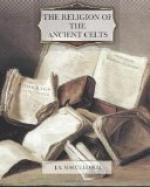Another son of Brigit’s was Ogma, master of poetry and inventor of ogham writing, the word being derived from his name.[255] It is more probable that Ogma’s name is a derivative from some word signifying “speech” or “writing,” and that the connection with “ogham” may be a mere folk-etymology. Ogma appears as the champion of the gods,[256] a position given him perhaps from the primitive custom of rousing the warriors’ emotions by eloquent speeches before a battle. Similarly the Babylonian Marduk, “seer of the gods,” was also their champion in fight. Ogma fought and died at Mag-tured; but in other accounts he survives, captures Tethra’s sword, goes on the quest for Dagda’s harp, and is given a sid after the Milesian victory. Ogma’s counterpart in Gaul is Ogmios, a Herakles and a god of eloquence, thus bearing the dual character of Ogma, while Ogma’s epithet grianainech, “of the smiling countenance,” recalls Lucian’s account of the “smiling face” of Ogmios.[257] Ogma’s high position is the result of the admiration of bardic eloquence among the Celts, whose loquacity was proverbial, and to him its origin was doubtless ascribed, as well as that of poetry. The genealogists explain his relationship to the other divinities in different ways, but these confusions may result from the fact that gods had more than one name, of which the annalists made separate personalities. Most usually Ogma is called Brigit’s son. Her functions were like his own, but in spite of the increasing supremacy of gods over goddesses, he never really eclipsed her.




